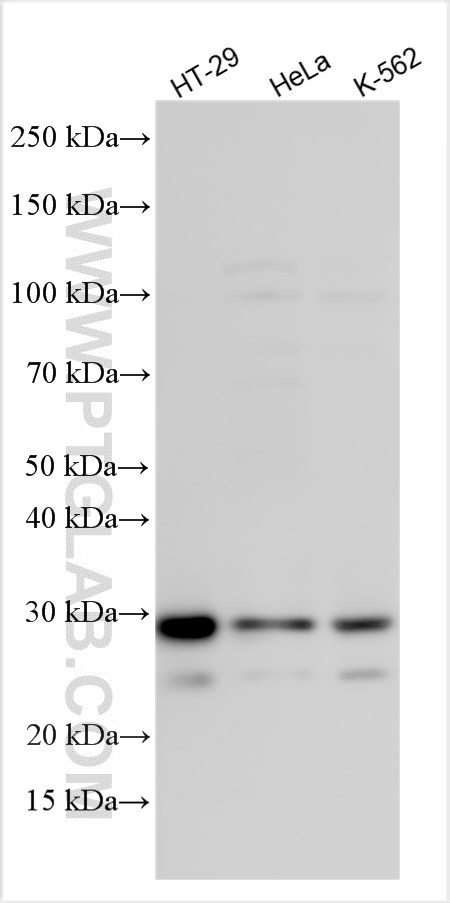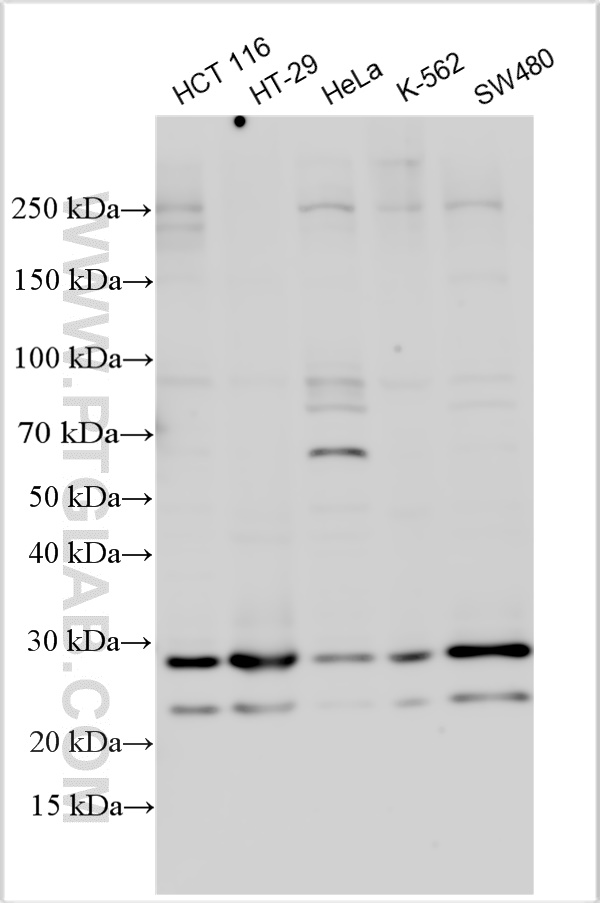验证数据展示
经过测试的应用
| Positive WB detected in | HT-29 cells, HCT 116 cells, HeLa cells, K-562 cells, SW480 cells |
推荐稀释比
| 应用 | 推荐稀释比 |
|---|---|
| Western Blot (WB) | WB : 1:500-1:1000 |
| It is recommended that this reagent should be titrated in each testing system to obtain optimal results. | |
| Sample-dependent, Check data in validation data gallery. | |
产品信息
26563-1-AP targets TIRAP in WB, ELISA applications and shows reactivity with human samples.
| 经测试应用 | WB, ELISA Application Description |
| 经测试反应性 | human |
| 免疫原 | TIRAP fusion protein Ag24230 种属同源性预测 |
| 宿主/亚型 | Rabbit / IgG |
| 抗体类别 | Polyclonal |
| 产品类型 | Antibody |
| 全称 | toll-interleukin 1 receptor (TIR) domain containing adaptor protein |
| 别名 | TIR domain-containing adapter protein, MyD88-2, MyD88 adapter-like protein, MyD88 adapter like protein, MAL |
| 计算分子量 | 256 aa, 28 kDa |
| 观测分子量 | 26-28 kDa |
| GenBank蛋白编号 | BC032474 |
| 基因名称 | TIRAP |
| Gene ID (NCBI) | 114609 |
| RRID | AB_3669548 |
| 偶联类型 | Unconjugated |
| 形式 | Liquid |
| 纯化方式 | Antigen affinity purification |
| UNIPROT ID | P58753 |
| 储存缓冲液 | PBS with 0.02% sodium azide and 50% glycerol , pH 7.3 |
| 储存条件 | Store at -20°C. Stable for one year after shipment. Aliquoting is unnecessary for -20oC storage. |
背景介绍
TIRAP, also known as MyD88-adaptor Like (MAL), is a crucial intracellular signaling molecule that plays a significant role in the regulation of immune responses, particularly in the context of Toll-like receptor (TLR)-mediated innate immune signaling. It functions as an adapter molecule that associates with receptor-mediated activation of host immune signaling. The innate immune system recognizes microbial pathogens through receptors, including TLRs, which identify pathogen-associated molecular patterns (PAMPs).
实验方案
| Product Specific Protocols | |
|---|---|
| WB protocol for TIRAP antibody 26563-1-AP | Download protocol |
| Standard Protocols | |
|---|---|
| Click here to view our Standard Protocols |

